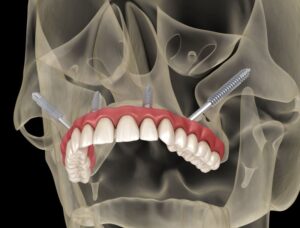
If you have suffered extensive tooth loss in your upper arch, you could be a candidate for traditional dental implants. However, if you have inadequate bone density in your jaw, you might be told that zygomatic dental implants are a better option. They are anchored in the zygoma (cheekbone) rather than the jaw, which makes them very stable and strong. But how long do zygomatic dental implants last? How does their performance compare to that of traditional implants? This blog post shares some relevant information.
The Average Lifespan of Zygoma Dental Implants
According to one study, zygoma dental implants have a 96% success rate after 12 years. That makes them comparable to traditional dental implants. In fact, both types of implants have the potential to last an entire lifetime if no serious complications arise.
The dentures on top of zygomatic dental implants can also stand the test of time; they may endure for many years before replacement becomes necessary.
What Could Cause Zygomatic Dental Implants to Fail?
Failure of zygomatic dental implants is rare, but it does happen to some patients. One common reason for this issue is sinusitis. In some cases, the implant’s pathway crosses the maxillary sinus. Unfortunately, this can lead to chronic swelling and inflammation of the sinus. In most cases, this issue can be resolved without removing the implant. In some instances, though, implant removal does become necessary.
Other possible reasons why zygomatic dental implants might fail include improper placement, infections, poor oral hygiene, and failure of the bone to bond with the implant.
Helping Your Zygomatic Implants to Succeed
Here are some steps that may reduce the risk that your zygomatic implants will fail prematurely:
- Make sure your initial placement procedure is performed by a well-qualified oral surgeon. Feel free to ask about your care provider’s credentials and experience.
- Maintain excellent oral hygiene. Diligent brushing and other good habits can do much to reduce your risk of infection.
- Manage your overall health. You should stay on top of any chronic health conditions and do your best to maintain healthy habits, such as eating a nutritious diet and avoiding tobacco products.
- See your general dentist twice a year. If they ever suspect something is wrong with your implants, they can advise you to see your oral surgeon for appropriate treatment.
Zygomatic dental implants are not immune to failure, but they are highly successful. In fact, they are an excellent long-term solution to tooth loss in the upper jaw!
Meet the Practice
At Piney Point Dental Implant Center in Houston, our surgical team offers a range of advanced services, including placement zygomatic implants. We combine extensive education and experience with state-of-the-art technology to optimize patient outcomes. If you have questions about your dental implant treatment options, we would be pleased to speak with you. Contact our office at 713-597-7340.

